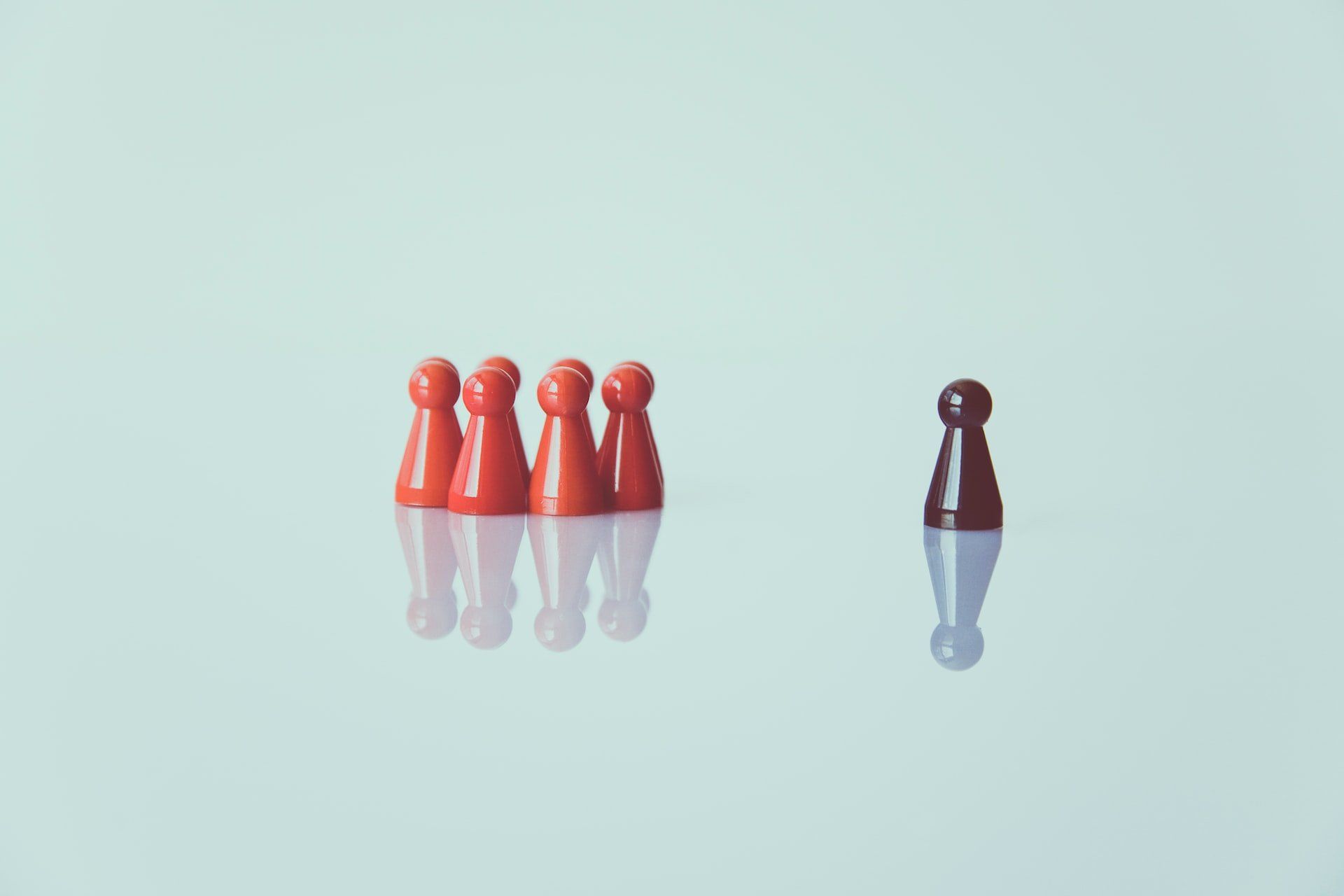








"Protected" Characteristics
Sadly, privilege and oppression are influenced by “race“, religion, class, sexual orientation, and gender, to name some protected characteristics according to the Equality Act 2010. This article focuses on “race”. Ethnic “minorities” can experience overt and systemic oppression on a daily basis. This presents in many ways, impacting social status, agency, access to resources, and a sense of belonging. Perhaps the world will never offer everyone unconditional positive regard, but as therapists we attempt to make a difference in our spaces by validating experiences, acknowledging injustice, and helping individuals access their inner and outer resources so they can fight systems of oppression and discrimination.
Mind Your Language
Before going further, language should be clarified. Orwell highlights the thoughtcrime that is “newspeak”, a rigid language that narrows thinking. This is the reason I have used quotation marks at times. Indeed, terms like “ethnic minority” are inaccurate and diminishing, “race” is inaccurate and divisive, and the popular Americanism “people of colour” though used by “people of colour” is objectionable. Because, if black is a colour, so is white, so synonymising all those who are not White holds implications.
These subliminal thoughtcrimes covertly implant inferences, and arrest thought and criticality. We psychologists pay particular and deliberate attention to our language, and that of our clients. We attend to the ways language is used in societies because discourses create narratives, which are loaded with psychological intention and impact real people, on many levels.
So I utilise ethnicity rather than “race” because scientists have confirmed that there is one human-race, and that the construct of race is politically and socially motivated with no biological basis. It powerfully maintains structural inequities and discrimination which create power disparities between groups. In fact, the definition of race in the pre-2010 Oxford dictionary is vague and ambiguous, and now Dictionary.com states; “…most scientists now consider race to be primarily a social rather than a scientific concept”
Cases In Point
Racism is damaging in micro and macro ways, impacting day to day lives, and group psyche, creating “racial” trauma. For example, the cases of Stephen Lawrence, Mark Duggan, Kalief Browder, and George Floyd enter the psyche of ethnic “minorities” and demonstrate how individuals in these groups are at the mercy of a corrupt system, in places that should be home. Having experienced direct and indirect racism myself, I wonder how individuals are supposed to reconcile injustice toward a fundamental aspect of self, in a society we feel a part of, but also repeatedly traumatised by.
Children Are Not Exempt
Esteemed Cambridge professor and hip-hop artist, Akala, who is ethnically Caribbean, Scottish and English, talks about his experience of systemic racism in British schools and the impact this had on his development and identity, something I sadly relate to. He recalls bullying from teachers and being placed in a special needs class without the school consulting his parents. Akala recounts a poignant moment when at age five he realised he was different from his mum; she asked him why he was upset after school and when explaining that “Mum, the White boy . . .” called him a nasty name, he realised for the first time that she too, was White.
The Very Real Impact
Legal Issues – Notwithstanding lower rates of substance use, Black people in the UK receive harsher treatment and are twice more likely to be charged with drug possession instead of being cautioned. This creates an expectation of being accosted, as ethnic “minority” individuals often witness friends and family being randomly apprehended. Thus Black men are overrepresented on the National Criminal Intelligence DNA Database despite the fact that men from mixed ethnic backgrounds, and elderly Asian people are more likely to be victims of crime than White counterparts.
Education – Black and Asian individuals will experience poorer educational outcomes, for example, they are more likely to be expelled at school, marked down at school and university, and less likely to be accepted into prestigious universities. In the US, White students are also less likely to be expelled because they are perceived to be more compliant.
Employment – The Department for Work and Pensions commissioned the National Centre for Social Research to investigate racism in recruitment. They found CVs with Anglicised names were shortlisted much more than those with Asian and African names. And so because individuals are less confident about gaining employment or even being shortlisted, they will work extra hard, and still fail to succeed much of the time. And even if employment is secured, individuals are often paid less than White counterparts, despite possessing similar qualifications and experience.
Housing – There are estate agents that discriminate against people who are not White, this means that only White people are able to rent or buy in certain areas. Historically, and possibly even now, red lines were used to mark maps so mortgage lenders knew which parts were predominantly Black neighbourhoods.
Mental Health & Misdiagnosis – So, ethnic “minorities” are at greater risk of poverty and homelessness due to racially motivated socio-economic disadvantage, placing them at higher risk of developing mental health problems, including psychosis. Evidently, there is plenty that can predispose individuals toward the development of distress, which we neatly categorise into disordered diagnoses, and yet, there is often an issue of misdiagnosis. But there is also the problem of projecting conditions into the individual and overlooking societal factors, which also impacts treatment. Indeed, and unsurprisingly, although White people are shown to experience higher rates of suicidal ideation, the risk of suicide is higher in young Black men, and middle-aged Black, and South Asian women. It is therefore important to be aware of the problems with medicalised psychiatric accounts of distress, and how “race-based medicine” leads to health disparities, and (mis)treatment.
Minority-Stress Model
Meyer’s minority-stress model offers insight into the stressors experienced by oppressed communities, as well as the impact these can have for physical and mental health. By understanding internalised consequences we can facilitate affirmative action. The model extends Maslow’s triangle of needs, proposing a non-hierarchical assumption, illustrating that although higher-order needs sometimes feel less prominent if basic needs are unmet, they are always important to some degree. This humanises disadvantaged groups by highlighting there still exists interest in esteem, self-actualisation, and belonging – all universal aspects of the human condition. By viewing individuals as having more than basic needs, might we be encouraged to offer more?
“If You’re Not A Part Of The Solution, You’re A Part Of The Problem” African Proverb
Psychotherapy should be multicultural, so as therapists we must be conscious of how our clients make meaning, within the context of their ethnicity. I suggest exploring ethnic and cultural heritage in respectful and curious ways to fulfil a basic psychological need – the need to belong, to have a sense of historical continuity, and to identify with the people with who we share historical values.
But through the shaming that happens time and again, this proud heritage and identity fragments, creating internal conflicts that become difficult to reconcile. So to facilitate integration, I suggest a tentative quality, keenly and sensitively attuning to our clients’ experience and readiness, and being careful to avoid imposing our own indignations and pride onto clients.
Instead, staying close, nurturing exploratory and experiential space, in which interrogations and struggles can courageously emerge, with the respectful, accepting therapist beside. There is utility in facilitating the kind of space in which clients feel free and able to unpack their experiences of systems that perpetuate racism, so they can ask out loud the questions that have been stifled by shame and oppression and replaced by a subconscious kind of newspeak.
This kind of space facilitates the emergence of feelings that are valid and should be given the spotlight, so awareness and change can be wrought in the growing flame. I have found when working in this way, whether it be to do with “race” or other forms of discrimination and bullying, that shame is diminished, and in the case of racism, pride in ethnic identity is gradually cultivated.
For therapists who are of a different ethnicity to their client, it is important to first reflect on our own difference and ethnic status. We must be able to sit with the discomfort of being viewed in terms of ethnicity, and admit that it matters, rather than deny it. This means naming it and its impact. For me, I realise it is important to consider that some White people can also experience racism and discrimination, for example, it has been well documented, and I have met people of Eastern European heritage who have experienced racism in Britain.
Conclusion
People who haven’t experienced racism can succeed in life without any need to interrogate these issues, and social forces prevent true understanding of ethnic inequality to maintain the social order and power disparity.
Therapists can’t afford to be ignorant however, because by ignoring ethnic status, we risk invalidating the client in front of us, many of whom I have heard say they “could never speak about these issues” with their previous therapist because of unspoken differences, fears of invalidation, and the related discomfort. And understandably so, because if we implicitly deny difference in ethnicity, we deny experience and the disparity of life opportunities, and outcomes, and in so doing, add to the distress already perpetuated directly and indirectly by others.
- Why Is Suicide So Prevalent In KPOP? RIP Moon Bin
- PTSD: Case Study of Thomas Shelby
- Paedophilic Obsessive-Compulsive Disorder (POCD) I
- The Value Of Confronting Self-Doubt As A Psychotherapist
- What Happens When Trauma Is Ignored, Vs When It's Not
- A Warm Welcome From Phinity Therapy
- Rehanna Talks Issues
- Rehanna Discusses Phinity Services
- The HEALTHIER WAY To Grieve
- What Your THERAPIST'S TITLE REALLY MEANS!

- Akala. (2021). Natives: Race and class in the ruins of empire. Hodder & Stoughton.
- Bhui, K., & McKenzie, K. (2008). Rates and risk factors by ethnic group for suicides within a year of contact with mental health services in England and Wales. Psychiatric Services, 59(4), 414-420. https://doi.org/10.1176/ps.2008.59.4.414
- Cerdeña, J., Plaisime, M., & Tsai, J. (2020). From race-based to race-conscious medicine: how anti-racist uprisings call us to act. The Lancet, 396(10257), 1125-1128. https://doi.org/10.1016/s0140-6736(20)32076-6
- Department for Work and Pensions. (2009). A test for racial discrimination in recruitment practice in British cities. Norwich: Crown Copyright 2009.
- Dictionary.com. (2021). Definition of race. www.dictionary.com. https://www.dictionary.com/browse/race.
- Gajwani, R., Parsons, H., Birchwood, M., & Singh, S. (2016). Ethnicity and detention: are black and minority ethnic (BME) groups disproportionately detained under the Mental Health Act 2007?. Social Psychiatry And Psychiatric Epidemiology, 51(5), 703-711. https://doi.org/10.1007/s00127-016-1181-z
- Gannon, M. (2016). Race is a social construct, scientists argue. Scientific American. https://www.scientificamerican.com/article/race-is-a-social-construct-scientists-argue/.
- Gov.UK. (2013). Equality Act 2010: guidance. GOV.UK; GOV.UK. https://www.gov.uk/guidance/equality-act-2010-guidance
- Gov.UK. (2021). Victims of crime. Ethnicity-facts-figures.service.gov.uk. https://www.ethnicity-facts-figures.service.gov.uk/crime-justice-and-the-law/crime-and-reoffending/victims-of-crime/latest#main-facts-and-figures.
- Institute of Race Relations (n.d.) Inequality, housing and employment statistics. Available at: http://www.irr.org.uk/research/statistics/poverty
- Joseph Rowntree Foundation (2017). UK poverty 2017: a comprehensive analysis of poverty trends and figures. Available at: https://www.jrf.org.uk/sites/default/files/jrf/files-research/uk_poverty_2017.pdf
- Meyer, I. (2003). Prejudice, social stress, and mental health in lesbian, gay, and bisexual populations: Conceptual issues and research evidence. Psychological Bulletin, 129(5), 674-697. https://doi.org/10.1037/0033-2909.129.5.674
- Moodley., R, & Lubin., D. (2008) Developing your career to working with multicultural and diversity clients. In S. Palmer, & R. Bor, A Guide for Counsellors, Psychotherapists and Counselling Psychologists (1st ed.). Sage.
- Orwell, G. (2021). 1984. Wordsworth Editions Ltd.
- Release and London School of Economics. (2013). The numbers in black and white: Ethnic disparities in the policing and prosecution of drug offences in England and Wales’. London: Release.

